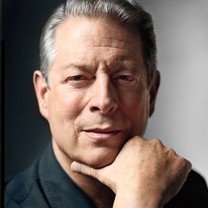Last September, millions of you joined us for 24 Hours of Reality, when we connected the dots between the extreme weather events happening all over the world and the reality of the climate crisis. Together, we saw that we don't need to travel far to see the impacts of climate change. Most of us are already feeling those impacts close to home.
Yet the climate crisis is also causing momentous changes in remote regions far from major population centers, in places like Antarctica, Greenland and the North Polar Ice Cap. Some of the most dangerous changes in our climate system are the ones that often receive the least attention.
Consider that Antarctica, the massive continent at the southern tip of our planet, holds 90% of the Earth's ice. It is a frozen desert, covered in ice that at some points is two miles thick. What happens to the rest of the world as that frozen water is released, at ever increasing rates, as a result of the rising temperatures caused by climate change?
Even though Antarctica is thousands of miles distant from the rest of the world, the melting ice on this continent should be of paramount concern to all of us. As our planet's ice melts, sea levels are rising steadily. This increases the risk of storm surges, coastal floods, diminished supplies of drinking water for billions of people, and hundreds of millions of climate refugees.
I first traveled to Antarctica in 1988. At the time, it was already clear that our southernmost continent stood at the frontier of the global climate crisis. Scientists expected that as climate change accelerated, Antarctica would be one of the fastest warming areas of the planet. This prediction has proven true: Today, the West Antarctic Peninsula is warming about four times faster than the global average. In many ways, it is the biggest "canary in the coal mine," signaling one of the largest impacts of climate change for the entire world.
To better understand the changes taking place near the South Pole and the impacts those changes will have around the world, I will be returning to Antarctica this month with The Climate Reality Project. A large number of civic and business leaders, activists and concerned citizens from many countries on this voyage will be joined by many of the world's leading climate scientists and Antarctica experts to see firsthand and in real time how the climate crisis is unfolding in Antarctica.
In parallel with this expedition, we are encouraging our partners and supporters to organize their own expeditions closer to home. Over the next few weeks, The Climate Reality Project will document how the melting of the world's ice is impacting us everywhere from Brooklyn to Bangladesh and from Ecuador to the Arctic. To follow these expeditions, I encourage you to keep checking our website, Living on Thin Ice.
Since my first trip to Antarctica more than 22 years ago, much has changed. The rate of ice melting has increased. However, there are many positive changes as well: The solutions to this crisis -- clean energy technologies like wind and solar, and solutions for improving the efficiency of businesses and industry -- have become exponentially cheaper and more widely available than ever before. The science has become even more robust, and the impacts have become far more immediate and severe. What hasn't changed, however, is that many of our political leaders around the world still lack the courage to solve the defining crisis of our age. Most significantly, a global movement to build and sustain the political will necessary is growing stronger every day.
I hope you will join me and The Climate Reality Project as we explore how changes on a remote continent are part of our shared climate reality. And I hope you'll take the time to explore the impacts climate change is having on your own community, whether through one of our expeditions or through one of your own. I'll be updating this blog soon with observations from Antarctica, and I invite you to check back on this page for more.





